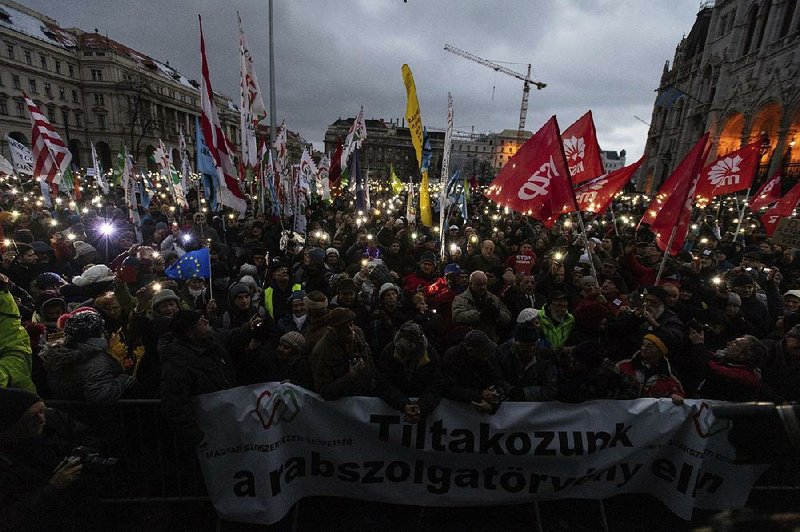BUDAPEST, Hungary -- Thousands of Hungarians, their winter coats zipped tight against a freezing rain, marched Saturday through central Budapest, voicing anger at a right-wing government and its attempts to snuff out nearly all domestic opposition.
The protest extended into a second month -- and a new year -- as part of a resistance movement taking shape as one of the most serious challenges to the authority of Viktor Orban, the four-term prime minister.
Orban has helped pioneer a new breed of autocracy in a country that threw off the shackles of communist authoritarianism three decades ago, and now serves as inspiration for other hard-line leaders in Europe and beyond.
His authority in Hungary is normally unquestioned -- with the political opposition divided and leaderless, and civil-society groups hemmed in by punishing laws. Much of the media are in his pocket and supposedly independent branches of the government are beholden to the ruling party.
In elections last April -- deemed free but not fair by independent observers -- Orban won a two-thirds parliamentary majority that gives him license to change the constitution at will.
Yet Saturday's protest offered fresh evidence that Orban -- normally sure-footed in keeping the public on his side -- may have erred with a series of recent moves that have provoked a backlash more intense and sustained than any in recent years.
Among the factors driving the unrest are the eviction of Central European University, the creation of a parallel justice system that will allow the government to bypass independent courts and the dead-of-night removal of a statue that paid tribute to a hero of the failed 1956 anti-Soviet uprising.
But the most important trigger for the demonstrations was legislation, which was jammed through the parliament last month with little debate, that allows employers to force workers to perform as much as 400 additional hours of overtime per year, and delay paying them for up to three years.
"Resign! Resign!" demonstrators chanted as a column of marchers stretching many city blocks made its way along Andrassy Avenue, the city's grand central boulevard.
"After the election, we had apathy. But then something changed," said Bernadette Szel, an independent lawmaker who has helped spearhead the protests. "This is fake democracy and people are fed up with it."
The workplace codes, dubbed "the slave law" by opponents, was the government's response to an ultra-tight labor market that has left employers struggling to find workers. Orban has been successful in attracting major European companies to Hungary, using low wages and other costs to make the country Europe's factory floor.
But hundreds of thousands of people have abandoned the country, seeking higher pay and greater freedoms elsewhere in Europe. The workers left behind are increasingly chafing under strain.
"The workers are already exhausted by the amount of work they're doing. The new law makes it even worse," said Bela Balogh, president of the Hungarian Metalworkers Federation.
Balogh's union was among a number of workers groups out in force Saturday. The unions have threatened more protests, as well as strikes, in the weeks to come.
Alongside the unions, civil-society groups and a hodgepodge of opposition parties have been the primary drivers of the demonstrations, which began with a series of protests last month.
Government spokesmen have dismissed the demonstrators as agents of George Soros, the Hungarian-American financier and the prime minister's all-purpose boogeyman.
"Today's rally is part of the election campaign of George Soros for the European parliament," said Balazs Hidveghi, a spokesman for the ruling Fidesz party, at a news conference. "He wants to import a pro-migration agenda. Therefore he's activating his supporters everywhere."
Opinion surveys suggest that Orban and Fidesz remain popular in Hungary, with especially robust support in the countryside and in small cities.
Orban has cast himself as the patriotic defender of Hungary against an invading tide of migrants. And with European parliamentary elections coming up in May, he has sought to transform the campaign into a struggle between his brand of "illiberal democracy" and the liberal and open societies advocated by Soros.
Saturday's protest unfolded peacefully as of midafternoon, with police blocking off large sections of the city center to allow demonstrators to make their way to the Hungarian Parliament building on the banks of the Danube.
The largest of last month's protests numbered around 15,000 demonstrators. Organizers said they hoped to exceed that figure Saturday.
Information for this article was contributed by Gergo Saling of The Washington Post.
A Section on 01/06/2019
